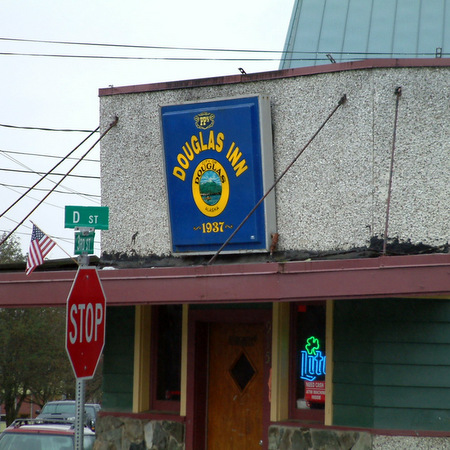
At least one set of potential buyers appear ready to purchase and restart a Douglas business that was seized by the Internal Revenue Service, but it’s unclear if anyone else is waiting for Wednesday morning’s auction.
PP’s Douglas Inn was seized by the IRS this spring because the former owner, Patrick Peterson, failed to pay nearly a million dollars in federal back taxes that he owed since 1999.
State corporation and business records indicate that a new limited liability company was created in mid-July called South of the Bridge. James Williams, Arbe Williams, and Abigail Trucano all hold nearly equal one-third ownership shares. The Williams may be best known as owners of North Pacific Erectors, a general contractor that has operated for over thirty years in the Juneau area. South of the Bridge and North Pacific Erectors even share the same Douglas post office box as a mailing address.
Shirley Coté, director of the state’s Alcoholic Beverage Control Board, the agency that regulates the manufacture, possession, and sale of alcohol, said they have already received an application for transfer of a beverage dispensary license formally used by David Sanden at the Triple F Bar and Grill in the Mendenhall Mall. South of the Bridge LLC have applied to use the license at a business identified as Louie’s Douglas Inn.
Coté said a temporary liquor license could be issued after the City and Borough of Juneau considers the potential transfer.
They would have sixty days to protest. And then the board would make the final decision at a board meeting. And, quite possibly as soon as October 2nd which is the next scheduled meeting.”
Messages left for the Williams were not returned. So, it’s unclear when they hope to reopen the bar if they successfully purchase it at auction, or if they plan on any renovations or changes to the business.
Peterson, who also failed to file or pay CBJ sales taxes and make his required state unemployment insurance contributions while he operated the bar, indicated in an interview with KTOO in early July that he might try to get his business back.
The property, including the structure and the land, was recently assessed by the City and Borough of Juneau at $242,000 in value.
But any purchase of the property would not include the liquor license. Coté said Peterson already surrendered his liquor license in June. It would’ve come up for a biennial renewal this December.
Coté said the sale of liquor licenses are transactions that are usually separate from the sale of a bar or restaurant.
The property doesn’t necessarily go with the license. The license doesn’t necessarily go with the property”
Generally speaking, Coté said a beverage dispensary license could go as high as $250,000.
Licensees aren’t required to share with us what their sales price is.”
Such a high price for some licenses is because of the limited number that is issued based on municipality’s population. Juneau, for example, with a listed total population of 32,290 people, is issued a maximum of twenty-two licenses for restaurants or eating places to sell beer and wine on the premises.
And then there are eleven, authorized non-restaurant/eating place licenses of each kind.
It’s not eleven total. It’s eleven of each of the twenty-some licenses that they could apply for.”
They include a license for a club, pub, recreational site, common carrier, package or liquor store, and a beverage dispensary license for a bar to sell all types of alcohol.
The auction is planned for 11 a.m. Wednesday, August 21st at the Dimond Courthouse. Bidders need to register an hour ahead of time.
According to ground rules set by the IRS, the winning bidder must pay 20-percent of the price at auction, preferably with cash, certified check, cashier’s check, or money order. The balance is due by September 10th.
At least eleven liens totaling $997,188.16 dollars were filed against Peterson and his business. Most of that is for unpaid quarterly federal employer taxes, but roughly a quarter is for a Trust Fund Recovery Penalty, or an attempt to recover employees’ Medicare and Social Security taxes that the employer did not pass on to the federal government.
Professor Scott Schumacher, director of the Graduate Program in Taxation at the University of Washington School of Law, said it’s unlikely that the IRS will recover the full million dollars at auction.
Just get the best that they could. The IRS is acting like any reasonable creditor would and so they going to try to maximize their value on that.”
Schumacher is familiar with the process after working as a trial attorney for the U.S. Department of Justice Tax Division and later as a private attorney defending clients on tax issues.
After the auction, Schumacher said the IRS will still have up to ten years to recover the Trust Fund Recovery Penalty. Those liens were not filed against the business, but specifically against Peterson as an individual.
They would do that analysis to look at who is a responsible person, and they would start going after assets like bank accounts. It’s not something that they’d normally do (which is) go after vehicles and houses. But it’s usually bank accounts, salaries, things like that. Then they would attempt to get paid as much as they can.”
Schumacher said it’s also possible that Peterson’s attempt to sign over the property to a friend down south earlier this year could prompt either a criminal charge or a civil suit by the federal government for a fraudulent transfer to evade taxes.
